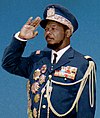Emperor of Central Africa
| Emperor of Central Africa | |
|---|---|
| Empereur de Centrafrique | |
Imperial | |
 | |
 | |
| Details | |
| Style | His Imperial Majesty |
| Formation | 4 December 1976 |
| Abolition | 21 September 1979 |
| Residence | Renaissance Palace, Bangui |
Emperor of Central Africa (French: Empereur de Centrafrique) was the title used by Jean-Bédel Bokassa from 4 December 1976, who was crowned on 4 December 1977 in a lavish ceremony that was estimated to cost the Central African Empire US$20 million (equivalent to $101 million in 2023). Although nominally a constitutional monarch, in practice Bokassa ruled with absolute power. For all intents and purposes, the country was still a military dictatorship, as had been the case with the Central African Republic since Bokassa took power in the 1966 coup d'état.
Bokassa I attempted to justify his actions by claiming that creating a monarchy would help Central Africa "stand out" from the rest of the continent, and earn the world's respect. The coronation consumed one third of the nation's annual budget and all of the French aid that year, but despite generous invitations, no foreign leaders attended the event. Many thought Bokassa was insane, and compared his egotistical extravagance with his contemporary – Africa's other well-known eccentric dictator, President of Uganda Idi Amin.
List of rulers
[edit]| No. | Portrait | Name (Birth–Death) |
Reign start | Reign end | Duration | Prime Minister | Note |
|---|---|---|---|---|---|---|---|
| Emperor of Central Africa (1976–1979) | |||||||
| 1 | 
|
Bokassa I (1921–1996) |
4 December 1976 | 21 September 1979 Deposed. |
2 years, 291 days | Patassé (1976–1978) |
He is the first emperor of central Africa from December 4, 1976, and deposed on September 21, 1979. |
| Maïdou (1978–1979) | |||||||
| Head of the House of Bokassa (1979–present) | |||||||
| 1 | 
|
Bokassa I (1921–1996) |
21 September 1979 | 3 November 1996 Died. |
17 years, 43 days | Vacant, since the monarchy was abolished in 1979. | Deposed on September 21, 1979, he became the Head of the House of Bokassa until his death on November 3, 1996. |
| 2 | Bokassa II (born 1973) |
3 November 1996 | Present | 28 years, 17 days | After his father died on November 3, 1996, he became the Head of the House of Bokassa from November 3, 1996. | ||
House of Bokassa
[edit]The House of Bokassa is an African former ruling imperial dynasty. The foundation of the House of Bokassa began in March 1972, when Jean-Bédel Bokassa proclaimed himself marshal and president-for-life of the Central African Republic. Public dissent continually grew over the next few years, surviving a coup attempt in December 1974, and narrowly escaped assassination in February 1976. International support was waning during this period as well, so in response Bokassa dissolved the republican government and established the Central African Revolutionary Council in September 1976.
On 4 December 1976, Bokassa instituted a new constitution, naming himself Emperor of the Central African Empire and his son, Jean-Bédel Bokassa II, was declared crown prince and heir to the throne. The emperor's sixth wife—Bokassa maintained a harem of 19 women despite converting to Catholicism. His wife Catherine Denguiadé, became the Empress of Central Africa.[1]
Neither the United States nor any European country acknowledged or supported the newly founded monarchy, with the exception of France, whose president, Valéry Giscard d'Estaing, held close ties to Bokassa.[2] By 1979, France had withdrawn its support as well. Pope Paul VI refused to take part in the coronation ceremony.
Bokassa I had 40 children by his 19 wives. Notable among these are:
- Jean-Serge Bokassa[3]
- Jean-Bédel Bokassa II, pretender to the Imperial Throne, formerly heir[3]
- Kiki Bokassa, an artist
Of his grandchildren, those notable include:
Bokassa also adopted several children, three of which were Africans. One of these, however, was born in Vietnam as Martine Nguyễn Thị Bái and became Martine Bokassa upon her adoption.
Gallery
[edit]-
Imperial Standard of Bokassa I.
See also
[edit]References
[edit]- Lentz, Harris M. (1994), Heads of States and Governments: A Worldwide Encyclopedia of Over 2,300 Leaders, 1945 through 1992, Jefferson, North Carolina: McFarland & Company, ISBN 0-89950-926-6, OCLC 30075961.
- ^ "The Exile Factor: Wives of Deposed Dictators". The Independent. 23 October 2011. Retrieved 28 January 2021.
- ^ BBC: "Good old days under Bokassa?"
- ^ a b Richard Bradshaw; Juan Fandos-Rius (27 May 2016). Historical Dictionary of the Central African Republic. Rowman & Littlefield Publishers. p. 130. ISBN 978-0-8108-7992-8.

